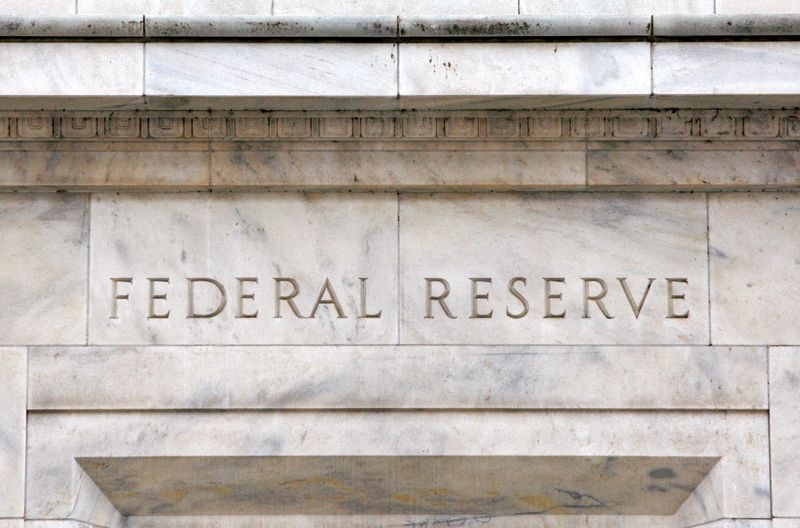By Balazs Koranyi and Karin Strohecker
FRANKFURT (Reuters) - The Federal Reserve's signalling of a slowdown in the pace of U.S. interest rate hikes takes pressure off global peers to keep on raising rates and offers relief to emerging markets, which have suffered their biggest rout in over a decade this year.
Central banks around the world have taken their cue from Washington in lifting borrowing costs at record pace.
So a signal in the minutes of the Fed's November meeting that policy tightening will soon slow has global ramifications, from a drop in global yields and rising stocks to a rebound in currencies against the dollar.
More importantly, the Fed's hint suggests that inflation may be coming under control, bolstering hopes of a "soft landing" for the world's biggest economy that could in turn cushion others, many of which are already in recession.
The inflation fight is far from over, especially in Europe, where the energy shock from the Ukraine has hurt most, but the Fed's shift eases the pressure on central banks to keep moving in big steps.
Major peers like the European Central Bank and Bank of Japan will clearly benefit but emerging economies, which moved early with rate hikes and suffered a double whammy of higher borrowing costs and currency depreciation, will be the biggest winners.
"Many emerging markets, for instance in Latin America, have reached peak rate pretty much already, and actually are in a position where they could take the foot off the accelerator a little bit if the Fed did," Paul Watters at S&P Global (NYSE:SPGI) said.
Emerging economies started hiking before the Fed, and quickly, partly because their currencies had weakened against the dollar, raising funding costs and importing inflation.
Before this month's hint of a Fed slowdown, the dollar index, which measures the greenback's strength against major currencies, had risen 18% year-to-date. That had quickly fed through to prices, especially energy and some food commodities that are generally traded in dollars.
The index has now dropped 6% from that peak, suggesting that some relief is already feeding through.
"This year's interest rate hikes in the United States are set to cut an estimated $360 billion of future income for developing countries, excluding China, and signal even more trouble ahead," the United Nations Conference on Trade and Development says.
UBS, which is predicting 8-12% returns in emerging market equities next year and 10-15% returns in the mainly dollar-denominated emerging market hard currency debt indexes, argues that emerging market assets have fared worse through the current Fed tightening than they have in the previous five cycles.
"Many countries are intervening to protect their currencies from rout," S&P Global said. "Total reserves in the emerging markets had fallen by over $400 billion, down 7%, this year as of September."
Though the Fed signals a respite, Nomura said some economies still face the threat of a currency crisis, according to its in-house "Damocles" warning system, which uses eight disparate indicators over a longer period to model risk.
"Damocles is flashing warnings signals for seven countries: Egypt, Romania, Sri Lanka, Turkey, Czech Republic, Pakistan and Hungary."
BNP Paribas (EPA:BNPP) meanwhile sees Hungary, Colombia, Egypt and Malaysia as most vulnerable, and notes that Brazil's fortunes are tied to the policies of the incoming government.
ECB & BOJ
At the ECB, the Fed's signal bolsters an already strong case for more measured rate hikes after back-to-back 75 basis point moves and eases growth concerns.
The euro's 7% rise against the dollar since its autumn lows will curb import costs, which are now quickly feeding into consumer prices via energy.
This shallower rate path will then ease growth and debt concerns especially on the euro zone's vulnerable periphery.
Italian bond yields are down sharply in the past month, while the closely watched spread between Italian and German borrowing costs is at its narrowest since May, signalling growing investor confidence in highly indebted Italy.
Slower Fed rate hikes also help the Bank of Japan, whose ultra-low rates have been criticised for fuelling a sharp yen decline that inflates the cost of imports.
Less downward pressure on the yen would give the BOJ space to gauge whether inflation will sustainably hold around 2% next year. On the other hand, if global yield moves stabilize, that could give scope for the BOJ to make its policy framework more flexible, some analysts say.
Sayuri Shirai, a former BOJ board member who is considered a candidate to become deputy governor next year, said a slower pace of Fed tightening would ease pressure on the BOJ to ramp up bond buying to defend an implicit 0.25% cap for the 10-year Japanese government bond yield.
"When the appropriate timing comes such as when the US monetary policy is becoming closer to the terminal rate, the BOJ should phase out its operation that offers to buy unlimited bond buying to defend its yield cap," Shirai said.
